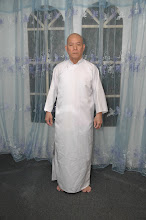Singapore time 8.35 am 27th March 2008
Chapter 26
"Repose gives health to the sick. Rubbing the eyelids removes the wrinkles of old age. Quiet will dispel anxieties. These remedies however are the resource only of those who need them. Others who are free from such ills pay no attention thereto. [Meditation practitioners should know that meditation also improves health.]
"That which the true Sage marvels at in the empire, claims not the attention of the Divine man. That which the truly virtuous man marvels at in his own sphere, claims not the attention of the true Sage. That which the superior man marvels at in his State, claims not the attention of the truly virtuous man. How the mean man adapts himself to his age, claims not the attention of the superior man.
Chapter 27
"Confucius," replied Chuang Tzu, "discarded both perseverance and wisdom, but did not attempt to formulate the doctrine in words. He said, 'Man has received his talents from God, together with a soul to give him life. He should speak in accordance with established laws. His words should be in harmony with fixed order. Personal advantage and duty to one's neighbor lie open before us. Likes and dislikes, rights and wrongs, are but as men choose to call them. But to bring submission into men's hearts, so that they shall not be stiff-necked, and thus fix firmly the foundations of the empire,--to that, alas! I have not attained.'"
Chapter 28
"To live with a man's elder brother," said T'ai Wang Shan Fu, "and slay his younger brother; to live with a man's father and slay his son,--this I could not bear to do. Make shift to remain here. To be my subjects or the subjects of these savages, where is the difference? Besides I have heard say that we ought not to let that which is intended to nourish life become injurious to life."
Thereupon he took his staff and went off. His people all followed him, and they founded a new State at the foot of mount Ch'i.
Now T'ai Wang Shan Fu undoubtedly had a proper respect for life. And those who have a proper respect for life, if rich and powerful, do not let that which should nourish injure the body. If poor and lowly, they do not allow gain to involve them in physical wear and tear. But the men of the present generation who occupy positions of power and influence, are all afraid of losing what they have got. Directly they see a chance of gain, away goes all care for their bodies. Is not that a cause for confusion?
In three successive cases the people of Yueh had put their prince to death. Accordingly, Shou, the son of the last prince, was much alarmed, and fled to Tan Hsueh, leaving the State of Yueh without a ruler. Shou was at first nowhere to be found, but at length he was traced to Tan-hsueh. He was, however, unwilling to come forth, so they smoked him out with moxa. They had a royal carriage ready for him; and as Shou seized the cord to mount the chariot, he looked up to heaven and cried, "Oh! ruling, ruling, could I not have been spared this?"
It was not that Shou objected to be a prince. He objected to the dangers associated with such positions. Such a one was incapable of sacrificing life to the State, and for that very reason the people of Yueh wanted to get him.
Wherefore it has been said that the best part of Tao is for self-culture, the surplus for governing a State, and the dregs for governing the empire. From which we may infer that the great deeds of kings and princes are but the leavings of the Sage. For preserving the body and nourishing vitality, they are of no avail. Yet the superior men of today endanger their bodies and throw away their lives in their greed for the things of this world. Is not this pitiable?
The true Sage in all his actions considers the why and the wherefore. But there are those nowadays who use the pearl of the prince of Sui to shoot a bird a thousand yards off. And the world of course laughs at them. Why? Because they sacrifice the greater to get the less. But surely life is of more importance even than the prince's pearl
Tzu Kung was much abashed at this reply; upon which Yuan Hsien smiling continued, "To try to thrust myself forward among men; to seek friendship in mutual flattery; to learn for the sake of others; to teach for my own sake; to use benevolence and duty to one's neighbor for evil ends; to make a great show with horses and carriages,--these things I cannot do."
Tseng Tzu lived in the Wei State. His wadded coat had no outside cloth. His face was bloated and rough. His hands and feet were horny hard. For three days he had had no fire; no new clothes for ten years. If he set his cap straight the tassel would come off. If he drew up his sleeve his elbow would poke through. If he pulled up his shoe, the heel would come off. Yet slipshod he sang the Sacrificial Odes of Shang, his voice filling the whole sky, as though it had been some instrument of metal or stone.
The Son of Heaven could not secure him as a minister. The feudal princes could not secure him as a friend. For he who nourishes his purpose becomes oblivious of his body. He who nourishes his body becomes oblivious of gain. And he who has attained Tao becomes oblivious of his mind.
Thursday, 27 March 2008
Subscribe to:
Post Comments (Atom)

No comments:
Post a Comment